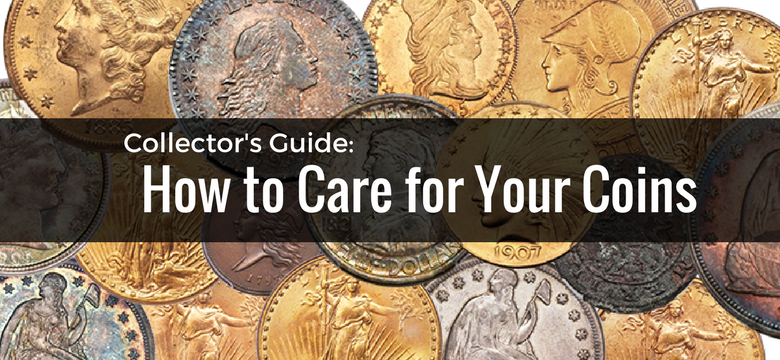Acquiring old coins, whether through pure chance or a shrewd purchase, can generate immediate excitement, and can lay the foundation for a lifetime of collecting, regardless of whether the new prize is the first acquisition or an addition to an already-significant inventory. If that happens, what is the best way to care for old coins?
First, stop and think. For some, the immediate response to acquisition of an old coin might be to shine it up. After all, if it is beautiful and hopefully valuable when crusted with the dark residue left over from oxidation and the oils in the hands that have touched it, imagine what it would look like with a bright, reflective shine! Right?
Wrong.
Don’t clean your coins. Think of coins like any other antique. Originality is preferred by serious collectors, and scrubbing or dipping old coins will affect the surface of the coin, and therefore the value. Before you consider washing or cleaning a coin in any way, consult a professional for help. This applies to caring for any potentially valuable or collectible coin, because most coins should not be cleaned in any way. An inexperienced collector might find an antique piece of furniture and be tempted to refinish it in an effort to bring out the wood’s original color, only to find out that doing so alters – make that reduces – the value because the original patina is worth more. It’s the same with coins: while the inclination might be to try to scrub a coin until a mirror finish is revealed, doing so actually reduces the value, in some cases significantly.
One of the worst things that can be done is polishing coins with some kind of metal polish that’s lying around the house. Almost every polish contains an abrasive agent of some kind, and polishing immediately starts scuffing and wearing down the features on the surface of the coin and damaging the coin’s luster – the shine that represents a significant part of a coin’s value – effectively decimating the coin’s resale value. If anything is applied in an effort to clean or restore a coin’s look – by a professional – make sure that the coins are patted or air-dried. Do not rub them! Even the softest, smoothest cloth can negatively impact the integrity of a coin’s surface and damage the luster, and therefore the value.
Brand-new condition, uncirculated or proof coins should be separated from other used coins. If you have to move a single coin, keep it away from other hard items – including other coins – that could damage the surface while in transit. Whenever possible, handle all coins by their edges; friction may cause damage and natural skin oils may stain or tarnish a coin in the future.
When coins, especially those that might have considerable value, are acquired, it can be tempting to handle them, but resist this urge. As a rule of thumb, handle coins as little as possible. Separate them – touching only the edges – into protective cases and get them to a professional for any possible restoration or cleaning.
Final note: Even experts who handle thousands of coins avoid cleaning them. Again, most coins should not be cleaned in any way. The only exception is when there is an active residue. The slime left from an older polychloride vinyl holder (PVC) is one case. Because the plastisizer in some holders can break down and leave a corrosive light green film, the film should be removed with chemicals, but again, in the interest of preserving a coin’s value, have a professional review and remove the green PVC film.
Keep in mind that when experts clean or “dip” coins, it involves risk, and the results are not always favorable. Old coins with tarnish hide the surface, and nobody really knows what exactly lies underneath. Thousands of dollars can be lost, even when handled by someone with decades of experience. If you receive an evaluation, or estimate of value, cleaning the coins may cost you a large sum of the money you expected from selling them. If you have questions about your coins please contact one of our numismatic experts.
Written by: Steve Lansdale
